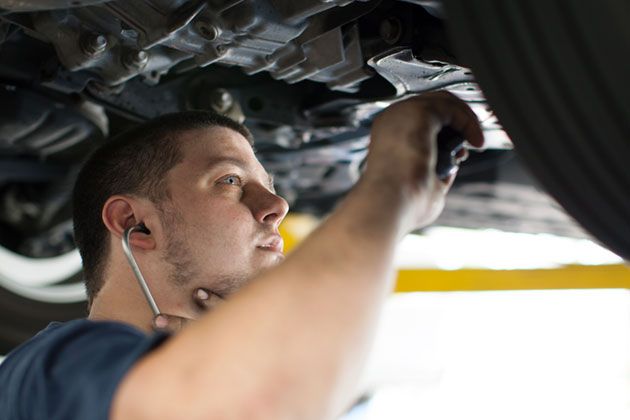5 Services You May Need Before Your Next Vehicle Inspection
Auto Shops Located in: Chapel Hill, Durham, Taleigh, Apex, and Cary North Carolina

Annual inspections can seem daunting for some drivers. You might be wondering about every minor vehicle issue and whether or not it will prevent you from passing. For peace of mind, you can read our breakdown of everything checked during your NC annual vehicle inspection.
Thankfully, NC annual car inspections are designed with safety in mind. If the issue doesn’t impact your safety or the safety of other drivers, then you have nothing to worry about. On the other hand, if it does pose a safety risk, then it is best to have this issue repaired before continuing on your trails. Here is a look at the 5 most common services drivers need to pass their annual safety inspection.
1: Windshield Wiper Blade Replacement
Your windshield wipers help you maintain visibility on the road during inclement weather. They can also help clear obstructions that may be blocking your vision. Because of the vital role they play in keeping your car safe on the road, you cannot pass your annual inspection without functional wiper blades. Issues often include tattered, dry rotted, missing, or ineffective windshield wipers. Thankfully, this is a quick and easy replacement service. So how often should you replace your windshield wiper blades? Most wiper blades need to be replaced twice each year.
What about windshield cracks?
While on the topic of windshield wipers, you might be wondering about your windshield itself. One common question we get from drivers is, “Will a cracked windshield cause me to fail my NC vehicle inspection?” While it might seem like a risk, small cracks in your windshields rarely pose a safety hazard. Windshields are made with layers of safety glass, which are industrially laminated together. Windshield cracks (even at their worst) will not impact the lamination keeping your glass together. As such, cracked windshields rarely prevent inspection passes. The exceptions are:
- Cracks that affect the driver’s vision
- Severely damaged or shattered windshields
- Cracks that impact another safety feature
For example, your rearview mirror must be securely mounted for a pass on your inspection. If windshield cracks prevent secure mirror mounting, this could prevent you from passing.
2: Brake Pad Replacement
Naturally, your brakes are a key point in your vehicle’s safety on the road. The most commonly needed service before an inspection is worn brake pad replacement. You cannot pass your NC safety inspection unless your brake pads have at least 2/32 of an inch of fictitious material left (at the very least). Our mechanics recommend changing out your brake pads when they are worn down to ¼ of an inch of friction material.
3: Tire Replacement
Tire health is key to passing your vehicle safety inspection. The most common tire issue leading to a failed inspection is worn tire tread. The tread on your tires grips the road, allowing traction for starting, stopping, and handling your vehicle.
If you are going in for your emissions inspection, you will also want to check for low tire pressure. You can find insight in our guide to checking tire pressure here. We also offer insight into low tire pressure causes and their solutions. If you need help, Chapel Hill Tire will check and refill your tire pressure for free during any oil change visit.
4: Catalytic Converter Replacement
As we explored in a recent post, catalytic converters are being rapidly stolen across the country. Have you been an unfortunate victim of catalytic converter theft? If so, you will need to have a catalytic converter replacement service before your annual inspection. Drivers who put off catalytic converter replacement will face a failed inspection. Properly functioning catalytic converters are needed to pass both your NC safety inspection and your NC emissions inspection.
5: Vehicle Light Services
All vehicle lights must be working effectively for a pass on your safety inspection—including your turn signal lights, headlights, and brake lights. Thankfully, light issues are often quickly repaired with a bulb replacement. To pass your inspection, you may need:
Unfortunately, your light bulbs are not always the source of your car’s light troubles. For example, your headlights can become dim from oxidized lenses. Over time, the sun’s UV rays discolor the acrylic of your headlights, which requires headlight restoration service. In severe cases, oxidized lenses will cause you to fail your inspection. However, unlike burnt-out bulbs, this is a rare source of inspection failure.
Chapel Hill Tire | NC Car Inspections
Here at Chapel Hill Tire, we offer industry-leading NC inspection services. If you are worried about failing your inspection, we also offer the services you need to get your vehicle in top shape. Our experts proudly serve the greater Triangle area with 9 mechanic locations across Raleigh, Durham, Chapel Hill, Carrboro, and Apex. You can make your Chapel Hill Tire appointment here online to get started today!















